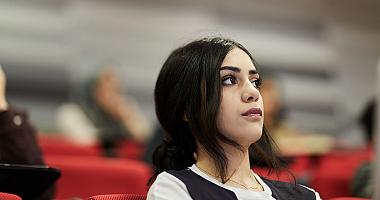BA (Hons)
Sociology
Content navigation menu
Why study BA Sociology at Goldsmiths
Our innovative BA Sociology programme will equip you with the practical tools to understand the world around you, and to think about how to change it for the better.
- You’ll be joining one of the world’s leading sociology departments. We've been rated top 10 in the UK for Sociology in the QS World University Rankings 2023.
- You’ll study contemporary local and global events to explore diverse issues, such as:
- How social inequalities operate and how they might be overcome
- How concepts of citizenship and human rights are contested
- How social and technological practices impact health
- How historical processes such as colonialism continue to shape today’s societies
- How the climate crisis requires us to develop new ways of thinking and acting.
- Our staff are specialists and pioneers in their fields. They write the books that are on reading lists across the country, and you’ll be working with them directly.
- We help you to discover the type of sociologist you want to be. You’ll ‘get messy’ with hands-on research methods modules in your first two years of study. In your final year, you’ll design and carry out your own research project based on your own interests. Recent projects ranged from Social Influencers as Digital Capitalists, to Conventional Beauty Standards and Black Women’s Hair Practices.
- You'll also have the opportunity to do a work placement and to take a module in another department.
- Diversified assessments will support you to consolidate your learning, and develop transferable skills. You’ll explore research design, data analysis, critical thinking, project management, working with others, and tackling inequalities knowledgeably and ethically, giving you an understanding of what it means to be a sociologist.
- The skills and the knowledge you gain during your degree will enable you to pursue a diverse range of careers. You’ll have transferrable skills that could allow you to work in the public and voluntary sector, the culture and media industries, marketing and corporate communications, arts administration, social research, and teaching. You’ll also be well-equipped to undertake postgraduate study in sociology, media, cultural studies, human rights, and related fields.
Contact the department
If you have specific questions about the degree, contact Dr Brett St Louis (Admissions Tutor) .
UCAS code
L300
Entry requirements
A-level: BBB
BTEC: DDM
IB: 33 points overall with three HL subjects at 655
Length
3 years full-time, 6 year part-time
Fees
Home - full-time: £9250
International - full-time: £19640
Department
Watch videos about your course
What you'll study
In your first year, you'll take the following compulsory modules:
| Module title | Credits |
|---|---|
| Methods of Worldmaking 1 | 30 credits |
| Modern Knowledge, Modern Power | 30 credits |
| Critical Readings: the Emergence of the Sociological Imagination 1A | 15 credits |
| Culture and Society 1A | 15 credits |
| Critical Readings: the Emergence of the Sociological Imagination 1B | 15 credits |
| Culture and Society 1B | 15 credits |
Note about optional modules (if available): The above is indicative of the typical modules offered, but is not intended to be construed or relied on as a definitive list of what might be available in any given year. The module content and availability is subject to change.
Teaching style
This programme is mainly taught through scheduled learning - a mixture of lectures, seminars and workshops. You’ll also be expected to undertake a significant amount of independent study. This includes carrying out required and additional reading, preparing topics for discussion, and producing essays or project work.
How you'll be assessed
You’ll be assessed by a variety of methods, depending on your module choices. These include coursework, extended essays, reports, presentations, practice-based projects or essays/logs, group projects, reflective essays, and seen and unseen written examinations.
Entry requirements
We accept the following qualifications:
A-level: BBB
BTEC: DDM
International Baccalaureate: 33 points overall with three HL subjects at 655
Access: Pass with 45 Level 3 credits including 30 Distinctions and a number of merits/passes in subject-specific modules
Scottish qualifications: BBBBC (Higher) or BBC (Advanced Higher)
European Baccalaureate: 75%
Irish Leaving Certificate: H2 H2 H2 H2
If you can't find your qualification here, then please visit our entry requirements page for a list of alternative qualifications.
Alternative requirements and selection process
We welcome students with a range of educational experiences. If you believe you may not meet the standard qualification requirements we would still encourage you to apply because we exercise flexibility where entry requirements are concerned, and make offers based on your enthusiasm and commitment to your subject, as shown by your application and personal statement, qualifications, experience and reference. If you don't have academic qualifications you may be invited to interview.
We’ll pay particularly careful attention to your personal statement, which is your opportunity to demonstrate your interest in the subject you’ve applied for. Your referees are also welcome to include any relevant contextual comments around your academic achievements. We’ll look at all these things when making a decision on your application, as well as your qualifications and grades.
We frequently interview mature applicants (over 21) or those with alternative qualifications, and have a long tradition of encouraging students from all social backgrounds to study at our university.
International qualifications
We also accept a wide range of international qualifications. Find out more about the qualifications we accept from around the world.
If English isn’t your first language, you will need an IELTS score (or equivalent English language qualification) of 6.0 with a 6.0 in writing and no element lower than 5.5 to study this programme. If you need assistance with your English language, we offer a range of courses that can help prepare you for degree-level study.
Fees and funding
Annual tuition fees
These are the UG fees for students starting their programme in the 2024/2025 academic year.
- Home - full-time: £9250
- International - full-time: £19640
If your fees are not listed here, please check our undergraduate fees guidance or contact the Fees Office, who can also advise you about how to pay your fees.
It’s not currently possible for international students to study part-time if you require a Student Visa, however this is currently being reviewed and will be confirmed in the new year. Please read our visa guidance in the interim for more information. If you think you might be eligible to study part-time while being on another visa type, please contact our Admissions Team for more information.
If you are looking to pay your fees please see our guide to making a payment.
Funding opportunities
We offer a wide range of scholarships and bursaries, and our Careers Service can also offer advice on finding work during your studies. Find out more about funding your studies with us.
Additional costs
In addition to your tuition fees, you'll be responsible for any additional costs associated with your course, such as buying stationery and paying for photocopying. You can find out more about what you need to budget for on our study costs page.
There may also be specific additional costs associated with your programme. This can include things like paying for field trips or specialist materials for your assignments. Please check the programme specification for more information.
Careers
Getting you ready for work
Sociologists enter careers that centre on the challenges and demands that members of a society face. This could be jobs in social services, education, criminal justice, welfare services, government, the voluntary sector, management, the creative industries, marketing and policy.
Over the last three years, some of the graduate level careers for Goldsmiths Sociology graduates have been:
- Events co-ordinator
- Grants officer
- Housing and welfare officer
- Learning support worker
- Local government graduate trainee
- Marketing manager
- Personnel manager and officer
- Public relations officer
- Researcher
- Social and youth worker
- Sustainability officer
We continuously review the how we integrate the academic and employability content of the course to reflect changes and innovations in the graduate labour market. Students benefit from Goldsmiths’ dedicated Careers Service, which can help you identify your career goals, review your CV or prepare you for interviews.
Recent employers of Goldsmiths sociology graduates include the BBC, Big Issue North, Holocaust Educational Trust, Oxfam, Tate, and the civil service. They’re working as researchers, human rights campaigners, teachers, diversity officers, and producers.
Students who achieve the best results during their undergraduate course may also get the chance to go on to postgraduate research for a higher degree with the aim of making a career in higher education either as a lecturer combining teaching with research or as a specialist researcher.
You can learn more about career options open to you after you graduate on our Sociology careers pages
Skills
The BA Sociology programme will help you develop the following skills:
- An understanding of current and emerging social problems and theoretical approaches central to sociology
- The capacity to carry out preliminary sociological research
- The ability to examine how social, public and civic policy can be influenced by sociological knowledge
- The capacity to compose and analyse sociologically informed questions
- The ability to investigate, appraise and communicate empirical information
- Research and problem-solving skills
- Communication skills
Throughout your degree you'll be encouraged to reflect on how the skills you are gaining can be useful to your future career. You'll also have the opportunity to meet our Department’s graduates and find out how their sociology degree gave them skills intrinsic to careers development.
We also work closely with the College’s Synapse programme, which provides workshops that will help you to develop both your employability and personal skills in critical and creative ways. In the context of a rapidly changing social and economic climate, these workshops provide you with valuable thinking time in which you can develop practical skills and also explore your ideas for your future.
Find out more about we help you improve your employability while at Goldsmiths




